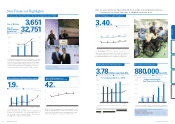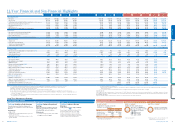Omron 2015 Annual Report Download - page 20
Download and view the complete annual report
Please find page 20 of the 2015 Omron annual report below. You can navigate through the pages in the report by either clicking on the pages listed below, or by using the keyword search tool below to find specific information within the annual report.
Omron Corporate Governance Policies*2. Every
member of our board of directors participated in
the deliberations and decisions leading up to the
announcement of this policy. It provided us an
opportunity to stand before our shareholders and
stakeholders and proudly present our beliefs
about corporate governance at Omron.
Toyama: I don’t think Omron could have hoped for
better timing between revising the Omron Principles
and introducing the Corporate Governance Policies.
Tateishi: We officially announced the revised the
Omron Principles in May 2015. As you say, it was
very good timing. At the time that President
Yamada took over in 2011, we all felt that our
employees had come to interpret our corporate
philosophy as simply doing things correctly. We
needed more awareness of creating solutions to
social needs and challenging ourselves, which lie
at the roots of the foundation of Omron as a com-
pany. So, in January 2014, the board of directors
began discussing how to best go about improving
Interview with Fumio Tateishi and Kazuhiko Toyama
Tateishi: We can trace the roots of governance at
Omron back to 1996. At the time, our chairman
Nobuo Tateishi was a member of the manage-
ment advisory group of the Organization for
Economic Cooperation and Development
(OECD). His service with the OECD instilled in
him the importance of corporate governance, and
under his guidance Omron established the Per-
sonnel Advisory Committee in 1996. In 1999, we
reduced the number of Omron board directors
from 30 to 7, and adopted an executive officer
system at the same time. This was the key
turning point for Omron as a company. Since
then, we embarked on a path of improved corpo-
rate governance. In 2001 we brought in our first
outside director, and in 2003 we separated the
positions of chairman of the board and CEO. We
also established the Compensation Advisory
Committee at that time, chaired by an outside
director. In 2006, we set up the CEO Selection Toyama: Governance is a means to improving a
Special Feature 2: Toward Effective Corporate Governance
Toward Effective
Corporate Governance
― Can you give us a brief history
of corporate governance at
Omron Corporation?
Omron Corporation and Corporate Governance:
A Path, Not a Destination
― Toyama-san, as a member of the Council
of Experts Concerning the Corporate
Governance Code, and Tateishi-san, from
your perspective as a corporate leader,
what do you believe is the significance of
the new Japan’s Corporate Governance
Code to Japan’s public companies?
Fiscal 2014 was a year in which many public companies looked to corporate governance as a means
to rebuild their earnings capacity. Following Japan's Corporate Governance Code, issued on June 1, 2015,
we met with Mr. Fumio Tateishi, Chairman of the Board of Omron Corporation, and Mr. Kazuhiko Toyama,
president and CEO of Industrial Growth Platform, Inc. and outside member of the Omron Board of
Directors to discuss Omron’s corporate governance.
Advisory Committee, also chaired by an outside
director. And, in 2008, we established the Corpo-
rate Governance Committee, which is a commit-
tee that consists entirely of outside directors as
members. Beginning fiscal 2014, we adopted
medium-term performance bonuses. The past 20
years has truly been a path and process of Om-
ron Corporation*1 building a better and stronger
corporate compliance structure. The Omron you
see today is the cumulative result of our steady
efforts to enhance long-term corporate value
over the years.
company, and not an end objective in itself. The
first consideration of corporate management is the
long-term growth of their company. The Corporate
Governance Code offers one model for this, but it
isn’t necessarily something that needs to be
implemented verbatim. At the end of the day, it’s
the responsibility of the company to build corporate
value. As long as they can do that—with or without
the Code—then they have accomplished their duty.
They don’t necessarily have to comply with the
Code as long as they can explain what they do. In
the same vein, corporate governance isn’t a silver
bullet. It’s something you need to address honestly
and work on over the course of time.
Tateishi: As I mentioned earlier, Omron Corpora-
tion has been engaged in a 20-year process of
improving governance to build sustained corpo-
rate value. We saw the publication of the Corpo-
rate Governance Code as another chance for us to
examine and systematize our own corporate
governance initiatives, and we view the Code as a
helpful guide in this process. The system we
formalized is what we published on June 24 in the
*2 See P. 65 for more.
*1 See P. 65 for more.
Special
Feature 2
Kazuhiko Toyama
President and CEO,
Industrial Growth Platform, Inc.
Outside Director, Omron Corporation
Fumio Tateishi
Chairman of the Board,
Omron Corporation
36 OMRON Corporation Integrated Report 2015 37
About Omron Where We’re Headed Corporate Value Initiatives Corporate Value Foundation Financial Section
























